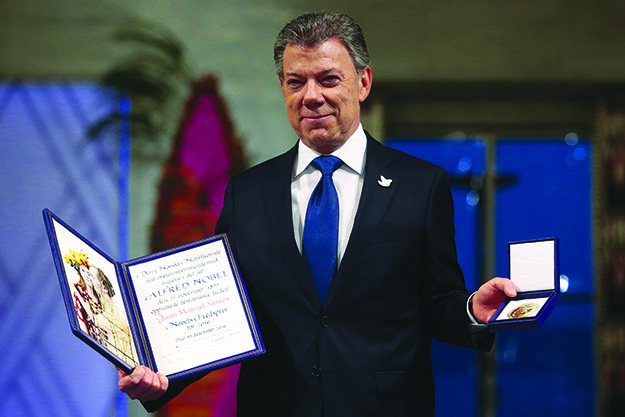This article is adapted from AQ’s print issue on peace and economic opportunity in Colombia. | Leer en español
Next May, Colombians will head to the polls to elect a new president. This should mark a new period of peace and prosperity for my country, as it will be the first election following the 2016 peace agreement between the government and the left-wing FARC insurgency. The agreement ended a brutal war that over five decades claimed more than 200,000 lives, forced the internal displacement of 7 million people, or 15 percent of the population, and prevented government access to communities under guerrilla control.
And yet, with seven months to go before the election the mood across Colombia is somber, and political debate is increasingly polarized and acrimonious. Polls show that three out of every four people believe the country is heading in the wrong direction. There is deep distrust of all branches of government and the people who lead them. “Vamos mal,” I heard often on a recent trip to Bogotá.
Ironically, much of the current pessimism can be traced back to the peace agreement, which was bitterly opposed by those who believed it granted too many concessions to a guerrilla army that had already been virtually defeated on the battlefield. No one has made this case more powerfully than former President Álvaro Uribe. Barred from running for a third term in office, he still enjoys the solid support of nearly half the electorate. He uses his senator’s bully pulpit and a belligerent Twitter account to warn that the demobilized guerrillas may have laid down their guns and joined the electoral process, but have never abandoned their ambition of transforming Colombia into an authoritarian, socialist state.
Supporters of outgoing President Juan Manuel Santos, who won the 2016 Nobel Peace Prize for engineering the peace agreement, acknowledge it is far from perfect. However, they believe a compromise was necessary to end a wasteful and debilitating conflict. The government’s lead peace negotiator once told me the war was like a stubborn mule that blocked the road, preventing Colombia from moving forward. It is a fitting image for a country with a huge urban-rural divide, where city-dwellers are overwhelmingly plugged in to the 21st century and yet peasant children still walk hours to reach the nearest school. Supporters of the agreement consider we have a unique opportunity to extend to all the benefits enjoyed by millions in Colombia’s fast-growing urban middle class.
I have never known Colombia at peace. Over the past 50 years the perpetrators of violence have been various: regional bosses who killed to establish their authority; the narcotics economy, which gave rise to Pablo Escobar and the drug cartels; the assorted urban and rural left-wing guerrilla groups, which waged war against the state; and right-wing paramilitary death squads that were often in league with rogue military officers. The atrocities committed by these multiple actors were part of the fabric of our lives. Bombings in crowded streets became shockingly routine, as did the targeted assassinations by Uzi-wielding teenagers. The abduction business took on an industrial scale with thousands of people held hostage, sometimes for years.
I suspect the angst expressed by my countrymen reflects a fear of the unknown. Colombia’s perpetual conflict served to paper over the many regional, income and ideological differences that existed between us. In a perverse way, it was the glue that kept us pushing in the same direction. But now that its end is perhaps within sight, that consensus has been broken.
Clear-eyed, Colombians are seeing the everyday problems of any normal democracy — fighting corruption, eliminating privilege, protecting and enhancing civil rights — come into sharp focus. Tackling them is a daunting task. “We killed the tiger, but lost our nerve when we saw it lying dead,” said a journalist friend, citing a Colombian peasant proverb.
Every country must face its worst demons before it can move on. For Colombia, that time is now. Former Brazilian President Fernando Henrique Cardoso reminded Colombians that the most difficult period in his country’s transition to economic normalization were the months immediately after the launch of his inflation-killing plan in the mid 1990s. “Change always means progressing toward the unknown, and one needs persistence, discernment and courage to advance those first steps, which are always very difficult.”
As the 2018 presidential campaign heats up, those fears of the unknown are being successfully stoked by opponents of the agreement, who paint an apocalyptic picture of the future. But Colombia will not follow the path of a Cuba or a Venezuela; throughout that long period of violence, Colombians built institutions — the courts, the military, civil society, governmental watchdogs, the media — that will never allow an authoritarian regime to install itself. These institutions are certainly not free of influence or corruption. But a current nationwide debate on the corrosive effect of political influence in judicial decision-making is proof of a somewhat evolving democracy.
Colombia’s greatest reassurance should be the caliber of candidates competing for the presidency in May, some of whom boast formidable political battle scars. The list includes a former vice president who led the government delegation during the peace talks in Havana; another former vice president and survivor of several assassination attempts; a former mayor of Medellín, who transformed a city regarded as a drug capital into a model of urban renewal and innovation; and Colombia’s first female minister of defense, whose tenure included one of the roughest periods of the war with the FARC. Several prominent male and female lawmakers and former cabinet members complete the lineup.
There is no guarantee that any of those candidates will make it to the final round; a more extreme figure might capture the popular imagination. But the considerable experience of Colombia’s presidential candidates speaks to the tumultuous nature of Colombia’s recent history, and also to the country’s ability to attract deeply committed talent to the most senior roles in government. Despite five decades of conflict, Colombia has continued to produce courageous leaders with a bulletproof faith in democracy — and in that lies enormous hope for the future.






